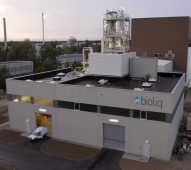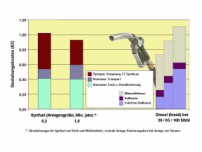Dr. Elisabeth Zuber-Knost Kaiserstraße 12 | |
|
Biomass will extend its lead as Germany’s regenerative fuel No. 1. In parallel, competition between energy producers and food producers for the use of agricultural and forest areas will increase. This conflict may be solved by novel biofuels generated from straw and residual forest wood. These are the major results of a study published by the Karlsruhe Institute of Technology (KIT) and funded by the Baden-Württemberg Ministry of Food and Rural Areas. The KIT is the cooperation between the Forschungszentrum Karlsruhe and the Universität Karlsruhe. |
For details, please contact: Forschungszentrum Karlsruhe Postfach 3640 |
|
In the coming decades, biomass will extend its lead as the most important regenerative energy carrier that can be used in many ways. This is the result of a study published by the Institute for Technology Assessment and Systems Analysis (ITAS) of the Forschungs-zentrum Karlsruhe. “With this, however, the question as to whether food or energy plants shall be cultivated on our fields will become even more important”, says Dr. Ludwig Leible (ITAS), the scientist in charge of the study. This ethic and politically explosive problem might be mitigated by biofuels of the so-called second generation. Their advantage: They are no competitors of bread and milk. Contrary to biodiesel from rape seed or bioethanol from corn, these novel, fully synthetic biofuels are produced from straw or residual forest wood. These materials are neither used as food or feedstuff nor do they need additional cultivation areas. Moreover, biofuels of the second generation are more pure, have a higher environmental compatibility, and are more adaptable (to stricter CO2 limit values) than fuels on the basis of petroleum. The head of the project, Ludwig Leible: “With the new biofuels, we may become more independent of petroleum and reduce the CO2 emissions of road traffic according to the targets defined by the EU without turning our fields into petrol stations.” |
The bioliq® pilot plant at the Forschungszentrum Karlsruhe
Fuel production from straw and residual forest wood – comparison of costs with petroleum-based diesel |
|
As far as the competitiveness of biofuel is concerned, the economic “break-even” has not yet been reached according to the calculations of the KIT scientists, but is within the range of vision: Provided that the biomass is acquired and distributed efficiently, diesel could be produced from straw and residual forest wood at about 1 Euro per liter. Hence, it will be competitive with conventional diesel, if petroleum costs climb to 130 dollars per barrel (presently: Roundabout 78 dollars), without subsidies like the exemption from mineral oil tax. Based on their studies, KIT scientists are in favor of intensifying the development of innovative technologies for fuel production from biomass. This also refers to the bioliq® process developed by the Forschungszentrum Karlsruhe. “bioliq®”, underlines Ludwig Leible, “has the additional advantage of a second option of use: Depending on the needs, the biomass may be processed to fuel or to important basic chemical materials like methanol.” Within the framework of the KIT Energy Center, the bioliq® process is currently being developed to maturity. At the Karlsruhe Institute of Technology (KIT), activities relating to biomass are allocated to the KIT Energy Center (renewable energy technology and energy systems analysis). The KIT Energy Center that is currently being established will have an annual budget of roundabout Eur 160 millions and, thus, be the largest research association of the KIT. The KIT energy researchers are aiming at leading the energy research efforts in Germany and Europe and at shaping these research activities in a decisive way. It is a particular strength of KIT research that new approaches like the bioliq® process are not only developed from the technical point of view, but also assessed comprehensively. Such analysis of the innovation potential and risks of a development as well as the investigation of the technical and social environment are specific competences of the Institute for Technology Assessment and Systems Analysis. The study entitled “Kraftstoff, Strom und Wärme aus Stroh und Waldrestholz – eine systemanalytische Untersuchung“ (Fuel, Electricity, and Heat from Straw and Residual Forest Wood – A Systems Analysis) (Verlag Forschungszentrum Karlsruhe, Reihe „Wissenschaftliche Berichte“, No. 7170) may be obtained from the Forschungszentrum Karlsruhe. It is also available online under http://www.itas.fzk.de/deu/lit/2007/leua07a.pdf. The Karlsruhe Institute of Technology (KIT) represents the merger of the Universität Karlsruhe with the Forschungszentrum Karlsruhe. Altogether, it has 8000 employees and an annual budget of 600 million Euros. In the KIT, both partners are bundling their scientific competences and capacities, establishing optimum research structures, and developing joint strategies and visions. The KIT will be an institution of internationally excellent research and lecturing in natural and engineering sciences. KIT shall attract the best experts from all over the world, set new standards in lecturing and promotion of young scientists, and establish the leading European center in the field of energy research. KIT will assume a leading role in nanosciences worldwide. It is the objective of KIT to be one of the most important cooperation partners of industry. | |
Press Release 05/2007
No Competitor of Bread and Milk
It is underlined by a study of the Karlsruhe Institute of Technology: Biomass as an energy carrier is becoming increasingly important. Novel biofuels might mitigate the growing conflicts in use.
jh, September 19, 2007
Contact:
Christian Könemann
Chief Press Officer
Phone: +49 721 608-41190
Fax: +49 721 608-43658
christian koenemann ∂does-not-exist.kit edu
Contact for this press release:
Inge Arnold
Presse, Kommunikation und Marketing (PKM)
Phone: +49 721 608-22861
Fax: +49 721 608-25080
inge arnold ∂does-not-exist.kit edu
Presse, Kommunikation und Marketing (PKM)
Phone: +49 721 608-22861
Fax: +49 721 608-25080
inge arnold ∂does-not-exist.kit edu


